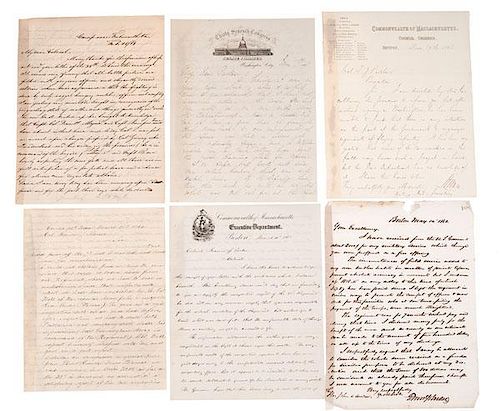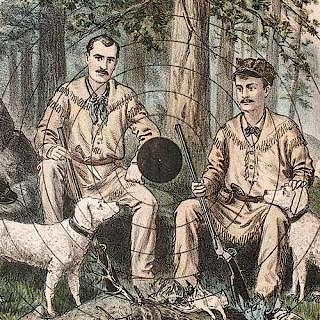Colonel Francis Parker and Brigadier General George L. Prescott, 32nd Massachusetts Volunteer, Civil War Archive
About Seller
6270 Este Ave.
Cincinnati , OH 45232
United States
With offices in Cincinnati, Cleveland and Denver, Cowan’s holds over 40 auctions each year, with annual sales exceeding $16M. We reach buyers around the globe, and take pride in our reputation for integrity, customer service and great results. A full-service house, Cowan’s Auctions specializes in Am...Read more
Two ways to bid:
- Leave a max absentee bid and the platform will bid on your behalf up to your maximum bid during the live auction.
- Bid live during the auction and your bids will be submitted real-time to the auctioneer.
Bid Increments
| Price | Bid Increment |
|---|---|
| $0 | $25 |
| $500 | $50 |
| $1,000 | $100 |
| $2,000 | $250 |
| $5,000 | $500 |
| $10,000 | $1,000 |
| $20,000 | $2,500 |
| $50,000 | $5,000 |
| $100,000 | $10,000 |
About Auction
Nov 20, 2015 - Nov 21, 2015
Cowan's Auctions dawnie@cowans.com
- Lot Description
Colonel Francis Parker and Brigadier General George L. Prescott, 32nd Massachusetts Volunteer, Civil War Archive
Lot of 70, ca. 1863-1908.
Commanding officers were essential in creating either solidarity or discord within regiments. Some were hated, but Col. Francis Parker was revered. Parker was a major in the Civil War and helped command the 32nd MA for a short six months. A Boston newspaper clipping offered in this lot announces his resignation. In it his men said:
We part with him, who a short time ago was an entire stranger to us, with extreme regret; and while life shall last he will be held in grateful, loving remembrance by every soul in the First Battalion Infantry, Massachusetts Volunteers. In proof of the feelings of others outside his command, the post band, on Wednesday evening, serenaded him their choicest pieces. In closing words of a sentiment offered last night, we say, "God bless him and confound his enemies."
The archive consists of over 70 pieces Parker received after his resignation from the 32nd MA from 1863 until 1865. Most of the items are letters written to Parker, with 11 that are letters previously removed from Parker's copy book. The items detail how much the 32nd MA suffered in his absence with his lack of leadership and how the dynamics changed under the poor leadership of other officers. Several other papers concerning his activity in the GAR until 1908 are also included in the lot.
Parker enlisted as a major on December 2, 1861 but was not commissioned into the 32nd MA Field & Staff until December 9. He served a short time in the regiment and resigned on December 27, 1862. He was promoted to lt. col. on May 25, 1862 and to the rank of col. three months later.
On December 13, 1862, two weeks before his resignation, the regiment participated in an assault on Marye's Heights at Fredricksburg. It lost 35 officers and men, the enemy killed six of them. Almost immediately after he left, on February 11th, the regiment failed its report. Humiliated, officer Joseph R. Robinson wrote to Parker on January 6, 1863:
You no doubt __ this have received communications from several jealous officers in relation to your official report to the Governor.
The object of the present is to inform you that I do not belong to that class and in no way or manner will I help to increase the present ill felling that exists among the officers in the regiment. I will be candid and say this however, that I have never felt so bad concerning anything in my life as I do about the "Roll of Honor," That I did my duty I am satisfied of, but as you were near me from the time we formed until we marched away from the field, I think that some of my acts were not favorable in your eyes- Do not for one moment include me in the ___ of those who are making trouble-
Shocked by the regiment's condition, Parker wrote to Col. J B. Sweitzer on February 23, 1863:
His Excellency Gov. Andrew has transmitted a copy of the report of Col. Johnson inspecting officers showing a very bad condition of affairs in the 32nd Mass. I receive the act as an intimation that I am responsible for that condition.
I could respectfully request your opinion as to my responsibility for the state of the regiment on reports and also on the condition of its men...
Few thought Parker was responsible for the state of affairs. In a second February letter Parker wrote to the Governor, I confess to a feeling of deep mortification at knowing of such an inspection report but believe that I can in a few days show to his Excellency satisfactory proof that if this be a correct report it is very different from those I had the honor to hold the command.
Morale plummeted and infighting ensued in the regiment. Private Octavius A. Merril wrote to Parker, the majority of officers commissioned in this Company, know as much about military duty as they do about the Hebrew language (July 14, 1863). Parker investigated by asking other officers why the report failed. He defended the regiment and questioned the circumstances surrounding the inspection. He admitted, however, it had some truths. He wrote to Lt. Col. Ritchie on March 7:
I believe that the report does the regiment great injustice and I believe that in such respects as it represents unfortunately yet correctly the state of affairs. the fact that the colonel had little or no experience or a field officer before taking the command should have been considered and should not be considered by his commanding officer.
The regiment lost their furlough due to the inspection and many of the officers resigned. Lt. Col. L. Stephenson wrote to Parker on March 8:
Capt. Bumpus[?] sent in his resignation today he felt very sore at Edmond's promotion. Uncle Dudley also resigned on account of a physical disability he should have added mental also. That he may get his discharge is the honest wish of every man in the Regt excluding perhaps "Cashman[?] the lobster dealer" March [?] resigned last week because he is superseded, he went yesterday to see some friend of his who is on Hooker's staff to get his papers through His friend introduced him to Gen Hooker who was so drunk that he came very near falling on him while he was in conversation with him . A strange man to put in command of 100,000 men I think God help those poor soldiers.
Griffen since Jon left has began to show the clover foot and is evidently bent on commanding the 32nd as far as it is in his power, he told me he was going to get the Regt broken up and distributed into other Mass Regs if it was possible. I told him I thought he would be obliged to try some time before he accompanied it. There is a better feeling towards the 32nd in the Brigade and the division than ever before everybody knows that we have been unjustly reported and the impression seems to prevail that it was Griffen's doings.
Parker's regiment combined with several others. It fought valiantly at Gettysburg under heavy fire at the Devil's Den region. Out of the 227 in action, the regiment lost 81, 22 were killed or mortally wounded. One of the wounded men was Brig. Gen. George Lincoln Prescott, and four of the letters in this archive surround his heroic death. A friend of Parker writes on June 23, 1864:
Poor Col. Prescott has attested to the last, his fidelity and loyalty: the first one to fall, of the Staff past and present, of the 32nd - a devoted wife and little children will mourn his death, while our country can count another soldier in the list of the faithful.
Prior to becoming a soldier, Prescott was a lumber dealer. He enlisted as a capt. at the age of 31. He was commissioned into the 5th MA Inf. Co. C on May 1, 1861 and mustered out July 13, 1861. He was commissioned into the 32nd MA Co. B as a capt. on October 31, 1861. Through a string of promotions he rose to the rank of brevet brig. gen. He was wounded at Gettysburg and Petersburg, but his wounds at Petersburg took his life. The Boston Daily Advertiser wrote, No man ever had a more real command over his regiment. No man could carry his men farther. Where he went they would follow.
A chilling list of the wounded and killed at Petersburg written by Fredrick Hoyt also accompanies the archive.
Parker may not have been physically present on the battlefield, but his thoughts were always with his men. He wrote to the family of one of the wounded men and wrote to his former officers, inquiring about their health and that of the regiment. After the war, he was an active member in the GAR. In December 1908, one of his men, William H. Thomas wrote:
I came across recently among my papers of that period, a copy of your farewell address as Major of the Battalion at Fort Warren. I bring to mind how it impressed me at the time so much so that I made a copy of it and have preserved it. I can see in my mind very clearly the occasion and how badly we all felt.
The touching tribute came to Parker a month before his death. The men of the 32nd were thankful for his short service and were better for it.Most of the letters are very legible and in excellent condition. The handwriting of a few of the men can be difficult to decipher.Condition
- Shipping Info
-
SHIPPING. At the request of the buyer, Cowan's will authorize the shipment of purchased items. Shipments usually occur within two weeks after payment has been received. Shipment is generally made via UPS Ground service. Unless buyer gives special instructions, the shipping method shall be at the sole discretion of Cowan's Auctions, Inc.. Cowan's is in no way responsible for the acts or omissions of independent handlers, packers or shippers of purchased items or for any loss, damage or delay from the packing or shipping of any property.
-
- Buyer's Premium



 EUR
EUR CAD
CAD AUD
AUD GBP
GBP MXN
MXN HKD
HKD CNY
CNY MYR
MYR SEK
SEK SGD
SGD CHF
CHF THB
THB





![[6] 1863 Varied U.S. Tokens HIGH GRADE](https://s1.img.bidsquare.com/item/m/2859/28591291.jpeg?t=1TdSmj)
![1874-1936 US Type Coinage Lot [3 Coins] HIGH GRADE](https://s1.img.bidsquare.com/item/m/2859/28591295.jpeg?t=1TdSmj)
![1841-1936 US Type Coinage Lot [3 Coins] HIGH GRADE](https://s1.img.bidsquare.com/item/m/2859/28591299.jpeg?t=1TdSmj)
![[2] 1934-1935 Silver Peace Dollar HIGH GRADE](https://s1.img.bidsquare.com/item/m/2859/28591303.jpeg?t=1TdSmk)



